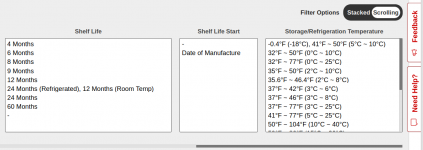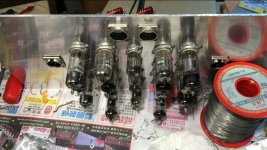I went shopping and drilling down through the options I noticed ‘shelf life’. Some spools of my seldom used diameters could date to the previous century. On occasion I use additional flux when needed. And I’ve had MOSFETs that refused to function properly until every last bit of flux was washed away from anywhere near the gate.
Could my problems be refrigeration? 😱
I have a ‘**** in my shop. A successful build calls for champagne. So when toasting, “That was a very good year …. for solder.”
Could my problems be refrigeration? 😱
I have a ‘**** in my shop. A successful build calls for champagne. So when toasting, “That was a very good year …. for solder.”
Attachments
I keep rolls of solder sealed in a plastic bag for several reasons, but not refrigerated,
and never have had any problems. Solder paste for smt work does need to be refrigerated,
and does have a limited shelf life (about 6 months).
and never have had any problems. Solder paste for smt work does need to be refrigerated,
and does have a limited shelf life (about 6 months).
When refrigerating anything containing solvents (such as solder paste), you need to be aware of the risks - too much solvent evaporation could form an explosive vapour, which could then be ignited by the door's light-switch on opening the fridge, causing life-threatening injuries (and building damage even).
Its something you are taught in no uncertain terms when starting lab work where solvents are used. If in doubt, check if this could possibly become an issue - many factors are involved, the particular solvent's volatility and flamability, quantity involved, size of fridge, nature of container. If in any doubt don't mix solvents and fridges. I've never refridgerated solder pastes and they tend to dry out over months/year timescale, its a reason to buy in small qtys only, such as a small syringe-ful.
Its something you are taught in no uncertain terms when starting lab work where solvents are used. If in doubt, check if this could possibly become an issue - many factors are involved, the particular solvent's volatility and flamability, quantity involved, size of fridge, nature of container. If in any doubt don't mix solvents and fridges. I've never refridgerated solder pastes and they tend to dry out over months/year timescale, its a reason to buy in small qtys only, such as a small syringe-ful.
Refrigeration of sealed packages of solder paste only, and when opened it should be used immediately.
Hello,
I don't know about temperature requirements for storing solder, but I have twenty year old (Kessler) solder that still works, flows and joints look just fine.
IMHO Doubt it is a real concern for most DIY.
Greg
I don't know about temperature requirements for storing solder, but I have twenty year old (Kessler) solder that still works, flows and joints look just fine.
IMHO Doubt it is a real concern for most DIY.
Greg
Same here.
Occasionally some Lady gifts me Dad´s or Grandpa´s solder she has no use for and "needs the room emptied".
Some of it way over 50 y.o. and ot´s easy to tell (if devoid of any packging) by the peculiar "real pine rosin" smell they let out when used.
Brings fond old memories and works as well as when new.
Occasionally some Lady gifts me Dad´s or Grandpa´s solder she has no use for and "needs the room emptied".
Some of it way over 50 y.o. and ot´s easy to tell (if devoid of any packging) by the peculiar "real pine rosin" smell they let out when used.
Brings fond old memories and works as well as when new.
Perhaps someone could explain the difference in flux composition which determines the difference in solder life. My current choice for everyday work is Fluitin 1532. Its label indicates only 3 years between manufacture and expiration. It is now 4 years past expiration and although still usable it does not flow quite as well as i remember.
I have had very old solder which simply refused to flow and had to be discarded. Rosin filled solders seem to last forever. A spool of 20 yo Cardas flows as perfectly as the day i bought it. No idea what flux it contains.
I have had very old solder which simply refused to flow and had to be discarded. Rosin filled solders seem to last forever. A spool of 20 yo Cardas flows as perfectly as the day i bought it. No idea what flux it contains.
- Home
- Design & Build
- Parts
- Are you refrigerating your solder?

